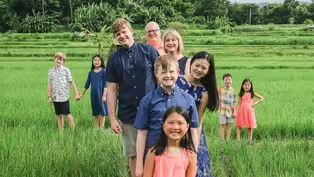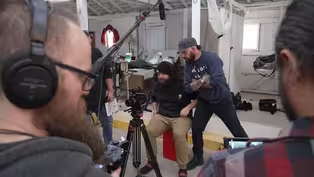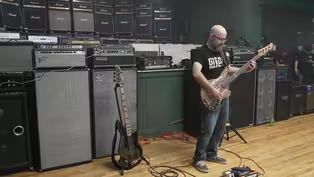
Iowa Bird Rehabilitation
Clip: Season 1 Episode 111 | 6m 43sVideo has Closed Captions
Learn about Jenni Boonjakuakul and her team of volunteers at Iowa Bird Rehabilitation.
More than 40% of the world’s birds have declining populations. Jenni Boonjakuakul and her team of volunteers at Iowa Bird Rehabilitation hope to stave off that trend, one feathered friend at a time.
Problems playing video? | Closed Captioning Feedback
Problems playing video? | Closed Captioning Feedback
Iowa Life is a local public television program presented by Iowa PBS

Iowa Bird Rehabilitation
Clip: Season 1 Episode 111 | 6m 43sVideo has Closed Captions
More than 40% of the world’s birds have declining populations. Jenni Boonjakuakul and her team of volunteers at Iowa Bird Rehabilitation hope to stave off that trend, one feathered friend at a time.
Problems playing video? | Closed Captioning Feedback
How to Watch Iowa Life
Iowa Life is available to stream on pbs.org and the free PBS App, available on iPhone, Apple TV, Android TV, Android smartphones, Amazon Fire TV, Amazon Fire Tablet, Roku, Samsung Smart TV, and Vizio.
Providing Support for PBS.org
Learn Moreabout PBS online sponsorship♪♪ Every spring and fall, hundreds of millions of birds migrate through Iowa, though we often take them for granted.
♪♪ Jenni Boonjakuakul: I don't think people understand how important birds are to our survival.
Birds play a huge role in insect control, in rodent control, they also are pollinators and seed spreaders.
♪♪ Jenni Boonjakuakul: And if we lose our bird population, it's going to have a direct impact on humans as well.
♪♪ Jenni Boonjakuakul: Wild birds are in decline.
It's a pretty devastating number.
25% to 30% of wild birds have disappeared in the last 50 years.
One question I am starting to ask people is, can you imagine a world without birds?
And I think that we take for granted when we walk outside, we hear the birds, we see them, we don't really think about that because they're there and they're always there.
But I think if we get to a point where we start losing their population or they disappear completely, it's going to be pretty noticeable.
♪♪ Jenni Boonjakuakul: Probably very few people know that nestled in a yard in the Beaverdale area of Des Moines is one of the busiest wildlife centers in the state of Iowa.
(goose honking) ♪♪ Jenni Boonjakuakul: So, we do specialize in just wild birds, so we don't take in mammals.
But we do take in nearly 2,000 birds a year.
♪♪ Jenni Boonjakuakul: Our goal is to take them in, give them medical treatment, medical care, rehabilitate them, get them ready for release and then release them.
♪♪ Jenni Boonjakuakul: So, this is our pigeon aviary.
All of these pigeons have come in through rehabilitation cases.
So, a lot of them have come in just injured or baby pigeons.
A lot of times people find them downtown.
I think this one maybe here is missing a leg and he was a rehab case.
His leg had been twisted up in some string and then he was hanging from I think it was a Bankers Trust sign.
And animal control was able to get him down and then we were able to amputate his leg because it was pretty mangled, and now he does great.
He flies well.
He flies around with the other pigeons and then he comes back.
We don't mind having them here.
Some of them might be a little bit more friendly than others.
(laughs) ♪♪ Jenni Boonjakuakul: I first got involved in bird rehabilitation when I was a graduate student in California.
I was at UC-Davis studying microbiology and I found a baby crow and I didn't know what to do with it, so I called one of my professors and he said, bring in a can of cat food and I'll show you how to feed it.
♪♪ Jenni Boonjakuakul: I did everything wrong.
It's actually illegal to raise a federally protected bird, which a crow is, and he imprinted on me.
So, there was just a lot of things that were not done well.
But after that I decided if I want to rehabilitate birds, then I want to do it correctly.
(crow squawking) Jenni Boonjakuakul: In 2012, I got my own permit to rehabilitate wild birds and started keeping track of our numbers.
And that year I took in 170 birds and this last year we took in almost 2,000 birds.
It definitely was not anywhere I imagined myself when I was in grad school.
I loved science and I loved research, but once I started working with birds, something just blossomed and I'm not sure if I can even tell you what that is.
It's just that these guys are remarkable and they're beautiful.
And I think what I love about working with wildlife is that it's not a permanent thing.
I am trying to get this bird back out into the wild as soon as I can.
♪♪ Jenni Boonjakuakul: This little guy is a wing injury that he's recovering from.
Nighthawks get hit by cars a lot.
They hunt at dusk when the insects are most prevalent.
Some of them just came in as babies, but they weren't quite ready to go, they weren't strong enough to go in the fall.
So, we were trying to over winter them, but they are a tougher bird to rehab.
Jenni Boonjakuakul: It's a lot of fun.
It's diverse.
One reason I went into science is because I wanted a job where it changed all the time and that's kind of what rehabilitation is with wild birds too.
Our day-to-day is never the same.
(baby bird squeaking) Jenni Boonjakuakul: We work with a vet when we need to, so if we need to get x-rays or special medication, we have a vet that we can work with.
But a lot of the medical is done by me and just through my experience.
So, I can set legs, I can set wings, we can give medication if the bird has an infection.
Want to get up so you can eat better?
Jenni Boonjakuakul: So, this is Jujube, she is a turkey vulture and she is one of our education birds.
She is about two years old now.
She came to us when she was probably about four or five months old.
She had wing deformities, so her wings can't extend fully, they kind of have a bend in them.
And when she arrived, she also had really horrible feather damage, which indicated to me that somebody had kept her in a cage for a while.
Jenni Boonjakuakul: So, she can't fly, but she is going to be a great education ambassador for us.
It's a great way for people to see a bird up close and personal.
We get to talk about Jujube in particular as a turkey vulture being a scavenger.
Without turkey vultures, our roads would just be a mess.
So, they are kind of a cleanup crew.
Kristi Brede: Everybody who seems to meet her loves her and I think that turkey vultures get a really bad rap.
Jenni Boonjakuakul: People love being close up to birds.
It's kind of one of the first things we hear is, I've never been this close to a bird.
(goose honking) Jenni Boonjakuakul: We are not just taking in birds from the Metro area anymore, we're taking them in from all over the state.
So, we're definitely at a point where we need more space.
I think that Iowa is ready for a wildlife center specifically for birds and that's kind of our next goal is to build a facility that is permanent, that can handle the number of birds that we take in, and it can also handle the variety of birds that we take in.
♪♪ Jenni Boonjakuakul: It goes beyond just saving this one bird.
I think that we are one small place in Iowa and I believe in the ripple effect.
Letting nature take its course, maybe in some instances that's sometimes what we have to do.
But we have the knowledge and we have the experience and we have the know-how to help a bird with whatever it's going through, then why not?
And why not give it that second chance?
♪♪
Video has Closed Captions
Clip: S1 Ep111 | 7m 58s | Learn how the Christofferson family prioritizes love and advocacy. (7m 58s)
Video has Closed Captions
Clip: S1 Ep111 | 5m 9s | A creative space for artists and filmmakers needing room to bring their vision to life. (5m 9s)
Video has Closed Captions
Clip: S1 Ep111 | 2m 44s | Jon Locker breaks a world record for the most guitar/bass amps connected at once. (2m 44s)
Providing Support for PBS.org
Learn Moreabout PBS online sponsorshipSupport for PBS provided by:
Iowa Life is a local public television program presented by Iowa PBS
















